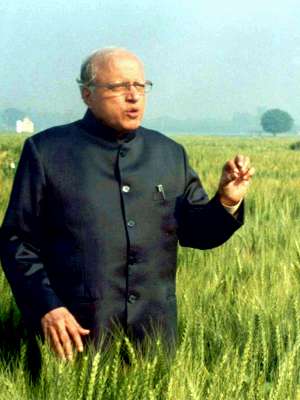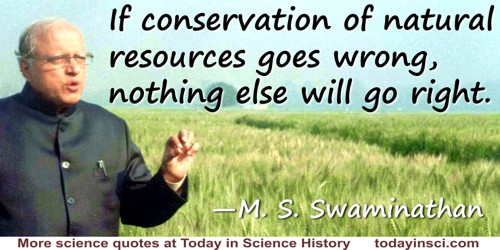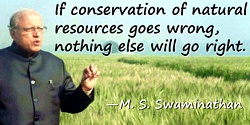 (source)
(source)
|
M. S. Swaminathan
(7 Aug 1925 - 28 Sep 2023)
Indian agricultural scientist and geneticist and international administrator, renowned for his leading role in India's “Green Revolution,” a program under which high-yield varieties of wheat and rice seedlings were planted in the fields of poor farmers.
|
Science Quotes by M. S. Swaminathan (13 quotes)
[Joseph Rotblat] was a towering figure in the search for peace in the world, who dedicated his life to trying to rid the world of nuclear weapons, and ultimately to rid the world of war itself.
— M. S. Swaminathan
Speaking as president of the Pugwash Conferences. As quoted in Associated Press syndicated to newspapers, for example in, 'Joseph Rotblat, Scientist Against Nuclear Arms, Dies', Sun Journal (2 Sep 2005), A5.
Agriculture is the backbone of the livelihood security system of nearly 700 million people in the country and we need to build our food security on the foundation of home grown food.
— M. S. Swaminathan
In 'Interview: We need to build our food security: MS Swaminathan', The Economic Times (11 Feb 2010), on economictimes.indiatimes.com website.
An ever-green revolution implies the enhancement of productivity in perpetuity without associated ecological harm.
— M. S. Swaminathan
In Sustainable Agriculture: Towards an Evergreen Revolution (1996), 219. Also quoted himself later, in 'Science and Shaping the Future of Rice', collected in Pramod K. Aggarwal et al. (eds.), 206 International Rice Congress: Science, Technology, and Trade for Peace and Prosperity (2007), 5.
Developing countries can leapfrog several stages in the development process through the application of bio-technology in agriculture.
— M. S. Swaminathan
In Arbind Prasad and Jagdish Prasad, Development Planning for Agriculture: Policies, Economic Implications, Inputs, Production and Marketing (1994), 93.
If agriculture goes wrong, nothing else will have a chance to go right in the country.
— M. S. Swaminathan
Quoted as “He had a strong belief” in Journal of Plantation Crops (2002), 30-33, 72. Also in Combating Hunger and Achieving Food Security (2016), 86, ending with wording “in our country”, referring to India.
If conservation of natural resources goes wrong, nothing else will go right.
— M. S. Swaminathan
Quoted in India Today (Apr 2008), 33, No 16, 130.
If farm ecology and economics go wrong, nothing else will go right in agriculture.
— M. S. Swaminathan
In 'Science and Shaping the Future of Rice', collected in Pramod K. Aggarwal et al. (eds.), 2006 International Rice Congress: Science, Technology, and Trade for Peace and Prosperity (2007), 5.
In India, rice is grown below sea level in Kuttanad in Kerala and at above 3,000 meters in Kashmir and Himachal Pradesh. The importance of rice as the mainstay of a sustainable food security system will grow during this century because of climate change. No other cereal has the resilience of rice to grow under a wide range of growing conditions.
— M. S. Swaminathan
In 'Science and Shaping the Future of Rice', collected in Pramod K. Aggarwal et al. (eds.), 206 International Rice Congress: Science, Technology, and Trade for Peace and Prosperity (2007), 4.
Population stabilization policies are a must for sustainable food, health, and livelihood security in many developing countries. If population policies go wrong, nothing else will have a chance to succeed.
— M. S. Swaminathan
In 'Malthus and Mendel: Children for Happiness', Politics and the Life Sciences (Sep 1997), 16, No. 2, 221.
The importance of rice will grow in the coming decades because of potential changes in temperature, precipitation, and sea-level rise, as a result of global warming. Rice grows under a wide range of latitudes and altitudes and can become the anchor of food security in a world confronted with the challenge of climate change.
— M. S. Swaminathan
In 'Science and Shaping the Future of Rice', collected in Pramod K. Aggarwal et al. (eds.), 206 International Rice Congress: Science, Technology, and Trade for Peace and Prosperity (2007), 4.
We need a new vision for agriculture … to spread happiness among farm and rural families. Bio-happiness through the conversion of our bio-resources into wealth meaningful to our rural families should be the goal of our national policy for farmers.
— M. S. Swaminathan
In 'Science and Shaping the Future of Rice', collected in Pramod K. Aggarwal et al. (eds.), 206 International Rice Congress: Science, Technology, and Trade for Peace and Prosperity (2007), 8.
We should look upon agriculture not just as a food-producing machine for the urban population, but as the major source of skilled and remunerative employment and a hub for global outsourcing.
— M. S. Swaminathan
In 'Science and Shaping the Future of Rice', collected in Pramod K. Aggarwal et al. (eds.), 206 International Rice Congress: Science, Technology, and Trade for Peace and Prosperity (2007), 8.
Who would be a better source of information about the forests than aborigines themselves because they have lived off the forest for most of their lives. The forests have provided the aborigines with food, medicine and shelter among other things and yet, the aborigines have never abused or ravaged the forest the way others have.
— M. S. Swaminathan
Keynote address yesterday at the 21st IUFRO World Congress (International Union of Forestry Research Organisations), Kuala Lumpur, Malaysia. As quoted in Lee Shi-lan 'Utilise Knowledge of Aborigines for the Conservation of Forests', New Straits Times (14 Aug 2000), 8.
See also:
- 7 Aug - short biography, births, deaths and events on date of Swaminathan's birth.
- More for M. S. Swaminathan on Today in Science History page.
- M. S. Swaminathan - context of quote “If conservation … goes wrong” - Medium image (500 x 250 px)
- M. S. Swaminathan - context of quote “If conservation … goes wrong” - Large image (800 x 400 px)
- Scientist and Humanist; M.S. Swaminathan, by R.D. Iyer. - book suggestion.
- Booklist for M. S. Swaminathan.



 In science it often happens that scientists say, 'You know that's a really good argument; my position is mistaken,' and then they would actually change their minds and you never hear that old view from them again. They really do it. It doesn't happen as often as it should, because scientists are human and change is sometimes painful. But it happens every day. I cannot recall the last time something like that happened in politics or religion.
(1987) --
In science it often happens that scientists say, 'You know that's a really good argument; my position is mistaken,' and then they would actually change their minds and you never hear that old view from them again. They really do it. It doesn't happen as often as it should, because scientists are human and change is sometimes painful. But it happens every day. I cannot recall the last time something like that happened in politics or religion.
(1987) -- 


